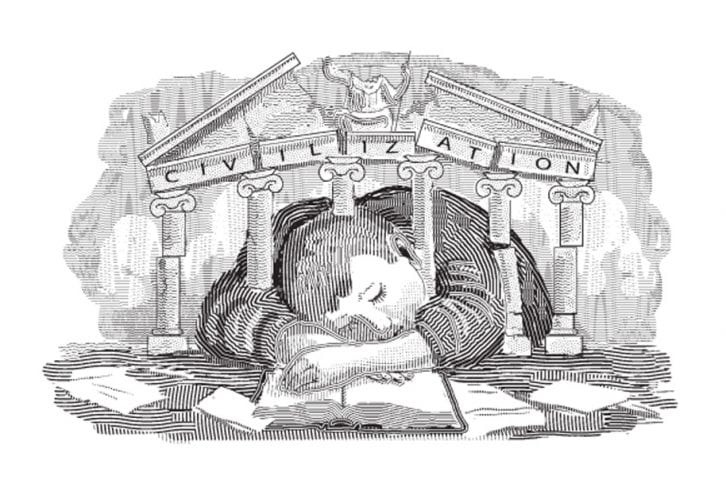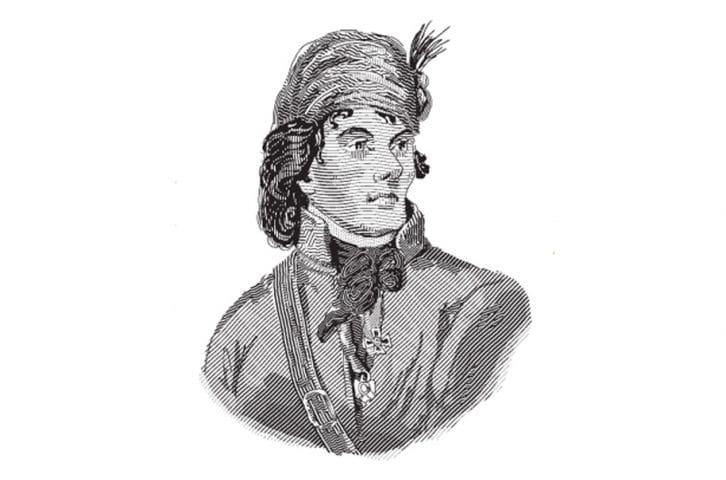A review of The Making of Americans: Democracy and Our Schools , by E.D. Hirsch
, by E.D. Hirsch
E.D. Hirsch has arguably done more for public school reform in this nation than any living American. Since his best-selling Cultural Literacy shared headlines with Allan Bloom's The Closing of the American Mind in the late 1980s, the University of Virginia professor of literature has persistently called attention to the things American children do not know and has explained in great detail the theory and practice behind why they do not know them. The short answer is that the nation's children-who turn into the nation's culturally illiterate adults-do not possess concrete knowledge because today's self-proclaimed "educators" do not teach it.
For 60 years or more public school teachers have avoided instruction in what they refer to dismissively as "mere facts," training students instead in supposedly more useful "skills." As a professor of education once told me, "It's not so important that children know things as that they know how to know things." Predictably, students graduate from public schools without either skills or knowledge since, as Hirsch has explained in dozens of ways, skills are dependent on knowledge. A person who is unfamiliar with the basic outline of Western history or the principal works of literature will, when reading a fairly complex text involving rich metaphors and subtle references, simply be unable to grasp the author's meaning. Any college professor who has let freshmen read a Federalist paper on their own knows that these high-school graduates might as well be reading Sanskrit.
Never content with merely exposing the dangerously low levels of Americans' reservoir of knowledge, Hirsch has worked tirelessly to get actual facts-whether stories, historical events, common metaphors, or rudiments of grammar-into young people's heads, beginning with his list of "What Literate Americans Know" (with entries from "1066" to "Zurich") at the back of Cultural Literacy. Since then, he has published dictionaries of cultural literacy, the popular What Your X-Grader Needs to Know series, and, through his non-profit Core Knowledge Foundation, created an exemplary curriculum for grades K-8, supplemented with excellent materials such as adaptations of the more difficult works of literature taught in the early grades.
Hirsch's most frustrating experience has been his warm reception among conservatives, including home-schoolers and certain charter-school founders, combined with the outright hostility directed at him by liberals and the education establishment. Hirsch is a man of the Left, the Old Left, as he points out in his new book, The Making of Americans. His deepest concern and sympathies are with disadvantaged children, mostly inner-city minorities who lack the (modicum of) knowledge and standard English normally acquired in suburban homes. Cultural literacy, or core knowledge, could help such children gain access to better jobs and full participation in the society instead of being marginalized by an obvious lack of preparation. Though clearly following in the tradition of Frederick Douglass and Booker T. Washington, to say nothing of Abraham Lincoln, in today's topsy-turvy political landscape, such notions are branded as right-wing, elitist, jingoist, and racist.
* * *
It is altogether fitting, then, that in his latest book Hirsch has become overtly political. Beyond linking acquired knowledge to viability in the work place, as he has done in previous books, he attempts to reclaim public schooling as a fundamental part of the political project embarked upon by the founders and continued by Lincoln. To this end, he quotes approvingly from Lincoln's Lyceum speech: "Let reverence for the laws…become the political religion of the nation." This reverence for the laws should be forged in schools, argues Hirsch, the common public sphere shared by all Americans. Americans are not simply born; they must be made.
Hirsch does not shy away, then, from patriotism in his book, but thinks that it has been the monopoly of the Right for too long. "The proper aim of American schools is not jingoism but loyalty to a truly glorious ideal." Because America "has a content" (a by-word of educationese), any useful debate in education must involve the C-word: curriculum. Hirsch's frequent criticism of the Right's school-reform agenda, which he renews in this book, is that a complacent faith in free markets-i.e., opening up public schools to choice, whether in the form of vouchers or charter schools-won't automatically turn the tide of school decline. Conservatives would do well to see what curricula charter schools adopt before endorsing them. Certainly President Obama's cozying up to charters in urban neighborhoods should give us pause. Has he seen the free-market light in one area of policy, or might the former community organizer realize the potential in schools that could teach, say, Howard Zinn's A People's History of the United States better than they currently are doing? What curriculum would we expect of an Obama Leadership Academy?
Among the several other reforms presented in The Making of Americans, the most noteworthy is Hirsch's re-labeling "Progressive education" the "anti-curriculum movement." So-called Progressive educators have been united not so much by a common agenda as by their hostility to any form of traditional subject matter and learning method. If only the new name would stick! Hirsch also attempts to fend off the criticisms of the multicultural Left, which claims that traditional content oppresses or marginalizes minorities. Every hyphenated-American group is entitled to enjoy its own rich culture in private, writes Hirsch, but the common school should concentrate on those things Americans hold in common. What's more, he insists that education must remain anchored in tradition, a point that has not always been clear in his thought, since "cultural literacy" could be imagined to shift considerably over time. As he explains,
I am a political liberal, but once I recognized the relative inertness and stability of the shared background knowledge students need to master reading and writing, I was forced to become an educational conservative…. Logic compelled the conclusion that achieving the democratic goal of high universal literacy would require schools to practice a large measure of educational traditionalism.
* * *
Yet even Hirsch's latest and most rooted manifesto is not without its flaws. He continues to overestimate what kids in the suburbs actually know, which, as far as I can tell, is not much. He doesn't stress phonics enough, because he thinks that to do so would diminish his primary thesis that background knowledge is the key to reading. He encourages reading stories and myths in order to add content to our minds but misses the way they ought to ennoble our souls. The conservative school-reform movement in this country is part of a wider effort at moral reform. The majority of home-schooling parents as well as those who send their children to start-up Christian schools or charter schools with traditional curricula are boycotting the public schools as much for moral as for intellectual reasons.
Consequently, Hirsch holds out too much hope of converting the Left while not welcoming his natural supporters on the Right. He underestimates the education establishment's fear and hostility towards knowledge and rigor, presenting the past "sixty years without a curriculum" as a well-meaning and forgivable misunderstanding. But Progressive education must be understood as an anti-teaching movement as much as an anti-curriculum movement. Anyone who suggests American education should be different from what it is now is subject to merciless attack by those who claim they would teach children even if they didn't get paid, while their unions push one demand: higher salaries for less work.
Despite his admirable inquiry into the political importance of education, Hirsch fails to see that the ruin of education is part of a larger plan. Progressive theorists did not just stumble into some bad pedagogy in the early 20th century. In order to replace constitutional government with unchecked bureaucracy, the Progressives had to attack the knowledge, reason, and habits of mind at the heart of the founders' education, ideas about the nature of man and his civic happiness that once were commonplace among American citizens.
But for conservatives to dwell on the shortcomings of The Making of Americans and Hirsch's larger curriculum project rather than praising their virtues would be like one man complaining about how another holds his hammer while the edifice is crumbling underneath both of them. For more than two decades this political liberal and educational conservative has been among the very few professors eloquently calling for a solid curriculum in order to rebuild public education. If one tenth of this nation's professors gave one tenth the attention to the issue that E.D. Hirsch has, the schools would be fixed by now. Until then, we continue to build higher education on a foundation of sand.



